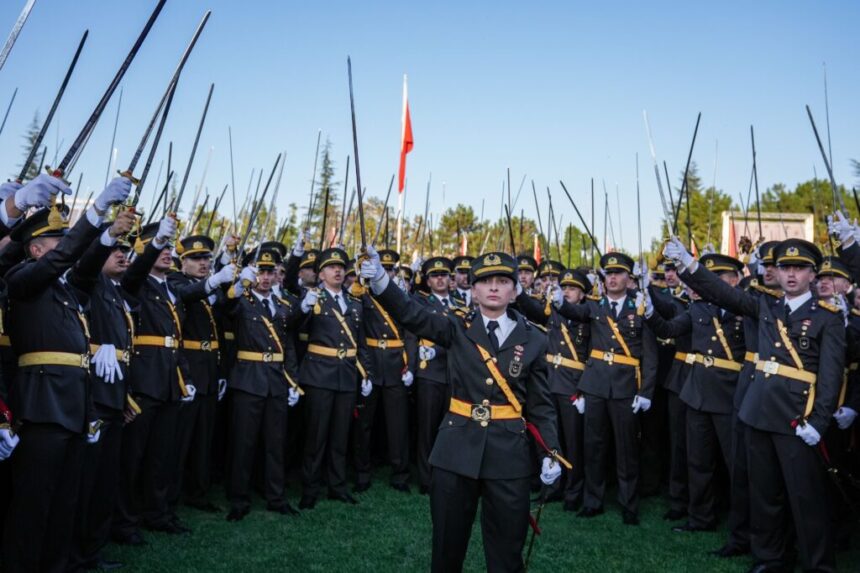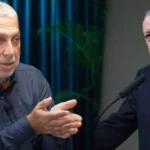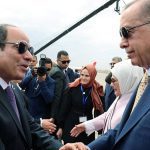The occurrence occurred in the presence of President Recep Tayyip Erdoğan and soon became a flashpoint in the country’s protracted political and cultural tensions. The slogan, which was chanted by the newly commissioned lieutenants after the official ceremony had concluded, was captured on video and extensively disseminated on social media.
The footage elicited a range of responses, with some individuals commending the cadets for their adherence to Turkey’s founding principles, while others criticized the action as inappropriate for military personnel, thereby initiating a contentious political debate. The slogan was promptly condemned by pro-government figures.
Mustafa Varank, a parliamentarian from Erdoğan’s Justice and Development Party (AKP), accused the cadets of reviving “old coup-era sentiments” and asserted that such actions threatened to undermine the military’s professionalism and discipline. In 1960 and 1980, Turkey experienced violent coups; however, the military’s political influence has been significantly diminished under Erdoğan, who survived an abortive putsch in 2016.
Varank stated on social media that the military is subject to rules and discipline, and no one in uniform is permitted to participate in political rhetoric. He also claimed that the opposition was attempting to exploit the military for its political objectives, a claim that was vigorously denied by government critics. The backlash was met with outrage by the opposition, particularly the Republican People’s Party (CHP).
Özgür Özel, the leader of the CHP, defended the cadets, contending that their chant was a patriotic expression of fealty to the republic and its secular foundations. “What additional information should they convey?” “We are the soldiers of Trikopis.” Özel responded by alluding to the Greek general who was defeated by Atatürk during the Turkish War of Independence.
Following the controversy’s escalation, the AKP and CHP members engaged in a verbal battle, with accusations flying from both parties. Varank accused the CHP of harbouring “authoritarian ambitions” and harbouring a desire for the military to return to politics, while CHP members criticized the AKP for attempting to eradicate Turkey’s secularist heritage.
The cadets’ actions were compared to those of the Janissaries, the elite Ottoman troops who frequently rebelled against the state, by political commentator Mümtaz’er Türköne. Türköne proposed that the incident reminded him of the period preceding the 1960 military rebellion, a moment in Turkish history that was profoundly divisive.
The incident at the graduation ceremony is indicative of the profound divisions that exist within Turkey regarding its identity and future trajectory. President Erdoğan, who has identified himself as a champion of conservative and religious principles, has frequently engaged in disputes with secularists who perceive him as a threat to the principles that were established by Atatürk.
There were reports that an internal investigation had been initiated into the cadets’ actions, with a focus not only on the graduation day events but also on the broader implications for military conduct and discipline in Turkey.
The objective of the investigation was to ascertain whether the cadets had acted independently or if there was a coordinated effort to exploit the graduation ceremony as a platform for political expression. The ongoing conflict within the nation regarding the military’s role in society was underscored by this examination, particularly in a country where the armed forces have historically been perceived as the protectors of secular principles.
The controversy emphasized the profound ideological divide between Turkey’s secularist founding principles and the more recent trend toward religious conservatism under Erdoğan’s leadership. Public opinion remained polarized throughout the investigation, with discussions roiling on social media, in news outlets, and among political commentators. The incident not only underscored the tensions between various political factions but also raised concerns regarding the future trajectory of Turkey’s military and its relationship with the state.
The incident served as a means for both political factions to bolster their respective narratives as the narrative progressed. The opposition perceived the backlash as an effort to suppress expressions of patriotism and fealty to the republic’s secular values, while the AKP and its supporters interpreted the cadets’ actions as a challenge to the reforms that had been implemented to depoliticize the military. The enduring and contentious debate over the nation’s identity and the legacy of its founder, Mustafa Kemal Atatürk, was exemplified by this event, which, despite its apparent isolation, became a microcosm of the larger cultural and political conflicts that shape modern Turkey.



